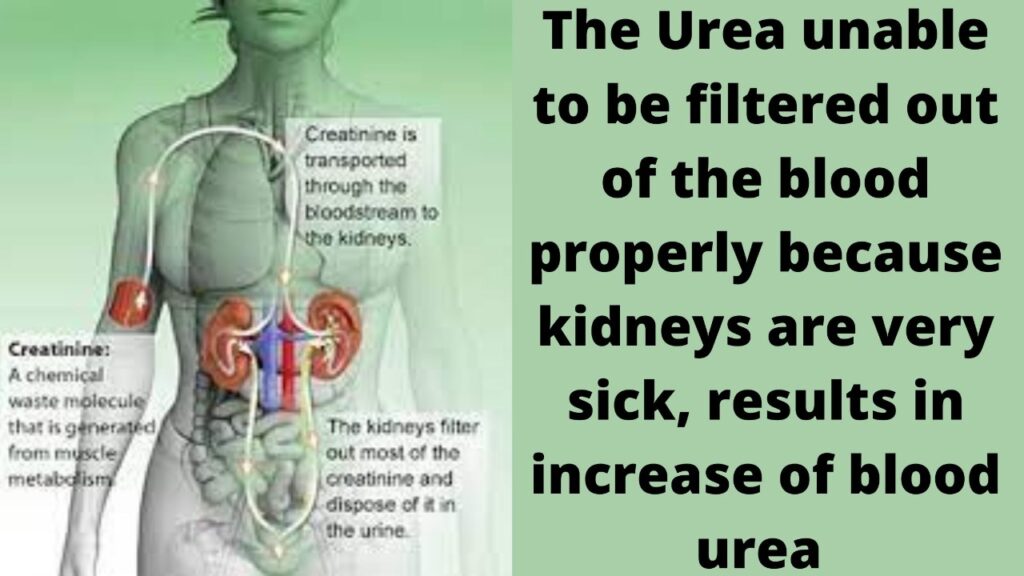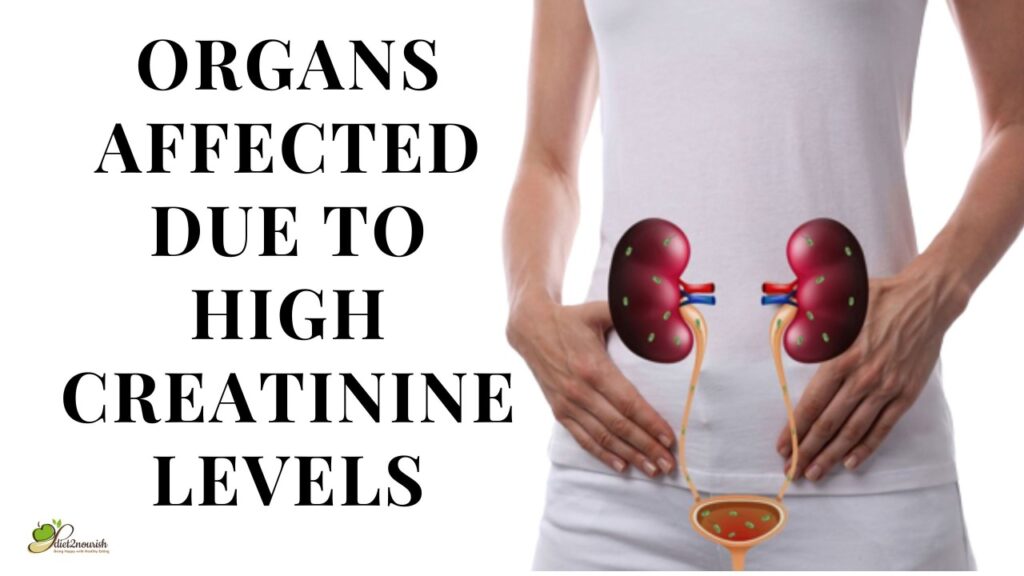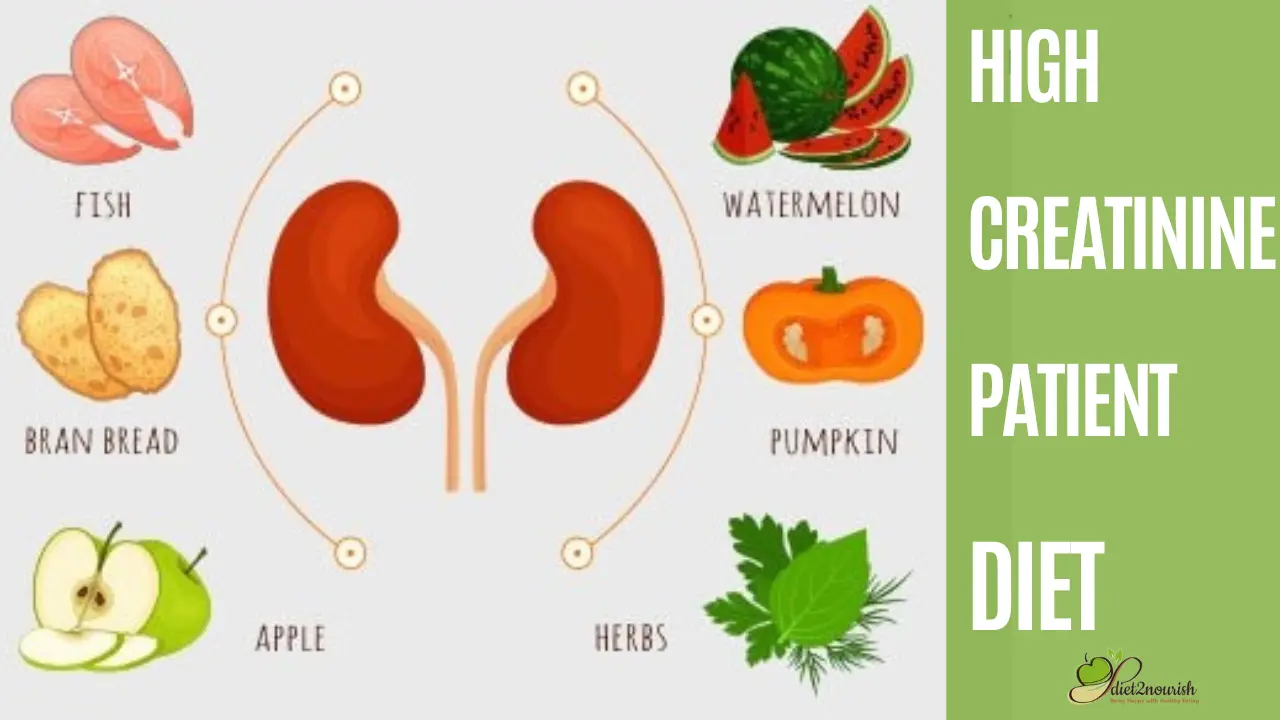We all have creatinine in our blood. It is an important part of our muscle and is produced in our bodies at a fairly constant rate depending on our body mass. It is spontaneously formed as a cyclic derivative and is normally filtered out of the blood by our kidneys. Although a small or negligible amount of creatine is actively secreted by the kidneys into the urine, increased levels of the same in the blood could be an indication of problems in our renal functions. Diet charts for high creatinine patients recommended by a Kidney Dietician can help you manage creatinine levels effectively.
Exactly what is creatinine?

In simple words, creatinine is a waste product. It is produced from the natural wear and tear of our muscle mass. Some amount of creatinine in the blood is normal. Its amount changes as per age, gender, body size, and to some extent your race. Diet charts for high creatinine patients can give you health solutions easily.
It is your body’s chemical waste. Mainly, found in the blood. It is filtered by your kidneys. The body flushes it out via the urine. It is quite normal to have this waste byproduct, due to our normal functioning of the muscles. In simple words, the more muscle you have, the more creatinine your body produces. The levels of creatinine in the blood of a person reflect two things:
- The amount of muscle a person has, and
- His or her amount of kidney function.
Why are high levels of creatinine bad for your health?

The kidneys work to give normal blood creatinine levels in the body. Thus, creatinine levels tell about the health status of your kidneys. But, high levels of the same in our blood says that your kidneys are not healthy. You can also be having some sort of kidney disease.
Due to some reason or the other, if your kidneys have impaired reason, the creatine in the blood rises, and this mainly happens because your kidneys are unable to properly clear the same out. Therefore, high levels of blood creatinine are a warning of possible malfunctioning or failure of your kidneys.
There may be many reasons for developing high blood creatinine levels apart from impaired functioning of your kidneys like intake of too much protein, intense exercise, and/or the use of certain medications or supplements. Simply understanding, higher levels of blood creatine is a clear indication that your kidneys are not filtering the blood effectively.
You must also know that your diet and lifestyle play a major role in managing creatinine levels, especially when guided by a Plant Based Dietitian focusing on kidney-friendly foods.
Your Diet and Blood Creatinine Levels
Dietary factors can play a major role in determining your blood creatinine levels. If you have any or more of these symptoms then you must immediately look into your diet and consult an expert:
- Feeling continuously fatigued
- Muscle cramps
- Feeling nauseated with vomiting
- See changes in your urination like frequency, pain, blood, and foaminess
- Swelling around your ankles and feet, and
- Puffiness around your eyes
If you have higher levels of creatinine in your blood, you can effectively reduce the levels by making certain dietary changes suggested by a Nutritionist for Seniors or renal patients, and follow Diet chart for high creatinine patient such as:
1. Reducing Your Protein Intake
It is a proven fact that cooked red meats can increase the levels of creatinine. These meats are muscle tissues that naturally contain creatine and creaking creatine further adds to the creatine levels.
If you need more proteins in your diet that go for vegetable sources like beans, peas, and alike and not for meats and fish.
2. Increase Your Intake of Dietary Fibres
You should eat dietary fibres. This can help your blood creatinine levels. It is also good for your creatinine levels. Go for plant based foods.
3. Drink water
levels of blood creatine may rise when you are dehydrated. It can put heavy strains on your kidneys. Therefore, drink a healthy amount of water. It is good for your body as well as your kidneys.
4. Control / Lower Your Salt Intake
Salt and salty foods contribute to high blood pressure, and foods like processed foods, are usually loaded with phosphorus and sodium, which further can cause renal / kidney diseases. Always focus on having more unprocessed foods and natural foods, and use more spices and herbs to flavor your food.
Indian diet chart for high creatinine patient
Diet plays a vital role for high blood creatinine levels.
The focus of an Indian diet chart for high creatinine patients works on the following goals:
- Decrease the workload on the kidneys
- It does not have some elements. They can cause higher levels of creatinine. So, the diet makes sure your levels are balanced.
- It will help you meet all your needs. You will not skip any vitals by eating these foods.
It is important to know that following a healthy Indian diet chart for high creatinine patients helps in keeping your kidneys healthy and managing the conditions better. Here is a list of a variety of Indian foods that consists of your Indian diet plan and will help you manage your high creatine levels.
Fruits:
For best results, eat:
- apple
- Papaya
- Guava
- Berries
- Watermelon
- Peach
Vegetables:
Best veggies for you are:
- Cabbage
- Cauliflower
- Carrot
- Onion
- Leafy vegetables
- Eggplant
Cereals:
The best cereals for you are:
- Wheat products
- White rice
- Pasta
Pulses and Legumes:
Add these to your healthy diet:
- Chickpeas
- Arhar dal
- Bengal gram
- Toor dal
Make sure your kidneys are all ok. You can do so by keeping a check on your fluid intake. Moreover, you must avoid all kinds of junk and packaged foods.
Diet chart for high creatinine patient
Kidneys perform some of the most critical bodily functions. Such as:
- filtration of the blood
- regulating the blood pressure
- maintaining electrolyte balance of the body
- producing urine.
But, when they are unfit, the food wastes, toxic elements, and fluid builds up inside the body. A healthy diet chart for high creatinine levels can help you.
It can save your damaged kidneys. Here are the basics on which a diet chart for kidney patients is prepared by experts:
1) Avoid foods with high amounts of potassium foods. They are:
- bananas
- kiwi
- avocados
- mangoes
- cantaloupe
- oranges
- papayas.
2. Avoid foods with high amounts of phosphorus. They can affect the kidneys.
3. Protein is vital but watch out how much you eat. It can put a load on the kidneys.
4. Cut down on the amount of sodium intake.
You should also keep a watch on your water/fluid intake. Too much could put heavy pressure on your kidneys.
5. For breakfast, eat foods like vermicelli and stuffed Indian bread or rotis. These foods are rich in nutrients. They can give your body energy without putting much pressure on your weak kidneys.
6. If your blood creatinine levels are high and you do not suffer from diabetes, you can consume rice for lunch.
7. You may also consume chapatti or other Indian bread but in limited amounts.
8. You may also go for freshly cooked homemade vegetables.
Best foods for high blood creatinine levels or kidney diseases:
1. Cauliflower
You can get many Vitamins by eating this. This veggie is very low in vitals that can put a strain on kidneys.
2. Blueberries
Blueberries have antioxidants. They can protect you against many health conditions. Kidney issues are one of them. They prove to be one of the best foods for renal patients. They are very low in potassium and phosphorus.
3. Garlic
You can use garlic for salt. This will give flavour to your food. It has Vitamin B6 and C. It can help you with burning in the body.
4. Onions
When it comes to a good renal diet, onions act as great taste enhancers. With the richness of B Vitamins and manganese, onions hardly have any potassium, sodium, and phosphorus.
Always remember that anything and everything that we eat and drink has a direct impact on our kidneys. It is thereby very important that whatever diet you choose with high blood creatinine levels, You must consult an expert dietician such as a Dietician for Diabetic Patients or Liver Dietician, as these conditions often coexist with kidney disorders. the stage of the disease you are in, and if there are any underlying health conditions that you have and needs to be addressed.
List of fruits to reduce creatinine level
Fruits are an important component of diet. They can satisfy your sugar cravings. You can choose these fruits to reduce your creatinine levels:
1) Guavas
Guavas can help support kidney health and overall function. They have antioxidants to help you. You can eat guavas to help your creatinine levels.
2) Apples:
The antioxidants apples have can help you. People with high creatinine levels must eat it. It is good for overall health because of its fibre.
3) Watermelon
It is a water rich fruit. Watermelon can flush out excess salts and toxins. Therefore, it can wash out creatinine from the kidneys and be a good option for people with high levels.
4) Pears
Pears are a fibre-rich fruit. They can help improve kidney function and ensure its health. Pears can lower creatinine levels and must be eaten by patients.
5) Peaches
Peaches reduce creatinine and ensure kidney health. They are low in protein and improve kidney function.
Include these seven vegetable in a creatinine patient diet chart
Make yummy meals with these seven vegetables in your diet chart. They will not help to lower your creatinine levels.
1) Cabbage:
Cabbage is high in vitals. It can help to reduce inflammation in the body and is good for high creatinine.
2) Red bell peppers:
Red bell peppers have all the crucial vitamins. They can help you with high creatinine levels.
3) Garlic:
Garlic can help your high creatinine. This vegetable helps your kidney health.
4) Cauliflower:
It is another vegetable that has all the vitals for a healthy kidney. In addition, it has folate. So, eat it in your diet.
5) Onion:
Onions have something called quercetin. It can help you with the symptoms. They are good for lowering creatinine levels in the body.
6) Eggplant:
Eggplant has tons of antioxidants. It can help you with high creatinine.
7) Cucumber
Fibre will help your gut. And water Content of cucumbers can flush creatine out of the body.
Frequently Asked Questions (FAQs) :-
1. When to worry about Creatinine levels?
2. What is the best way to manage Creatinine?
· Include fiber-rich food in the diet
· Eat seasonal fruits, vegetables, and whole grains
· Sip eight to ten glasses of water daily to prevent dehydration
· Avoid smoking and alcohol
· Limit the usage of pain killer medicines










